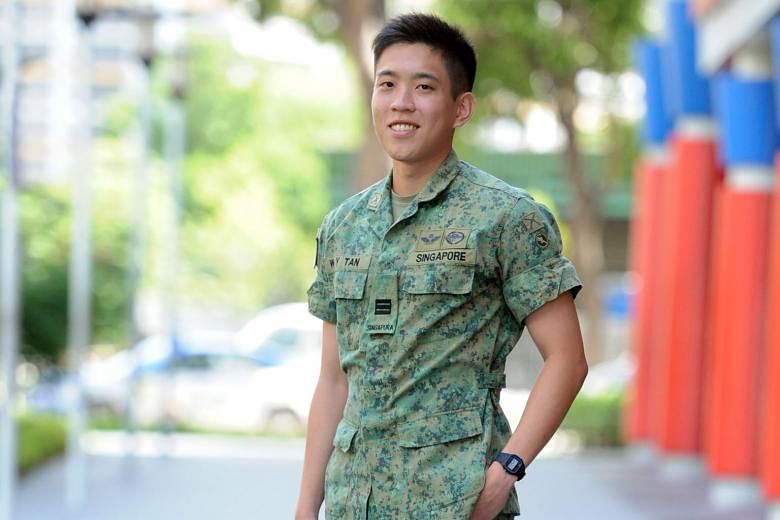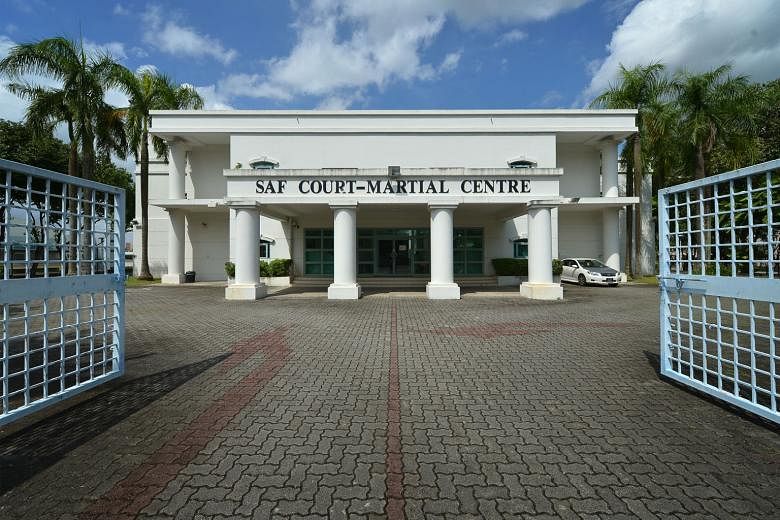At university, Captain Samuel Tan was an SAF scholarship holder studying international relations and public policy. In the army, he earned his epaulettes as an artillery officer.
But as an officer, the 26-year-old can also be called upon to defend servicemen in a court of law.
He is one of about 100 Singapore Armed Forces (SAF) officers who have attended Mindef's newly revised legal training course that will help them in their role as defending officers or DOs - a position that sees them representing personnel who have been court-martialled.
Under the SAF Act, any commissioned officer can represent servicemen in the military courts, where they are tried for military offences. The cases are heard at the Court-Martial Centre in Kranji Camp II.
According to Mindef, the day-long legal training course for defending officers was started in 2005, but it was revised in July last year, with more of the curriculum focused on the practical aspects of lawyering. DOs can also call a helpline for legal assistance.
Before 2005, there was no formal training for DOs.
Mindef's course is the only formal legal training DOs receive. However, not all DOs are trained.
The current revised course is held four times a year with a class size of about 30.
Capt Tan was taught basic court etiquette, how to draft mitigation pleas and how to make representations for his clients.
"Prior to attending the course, I thought the only avenue for redress or mitigation was the mitigation plea during a general court martial," he said.
He now knows that DOs can write to military prosecutors to get them to consider a lesser charge, drop charges entirely and get character references for their soldiers.
Last month, he managed to get the charges reduced for a soldier in his unit who ended up serving a sentence of six weeks.
Mr Asher Chin, 22, represented two soldiers - one for theft and the other for going absent without leave - in 2013 when he was a second lieutenant in the air force.
In both cases, he served as the soldiers' DO and the investigating officer.
"One of the bigger problems we faced back then was that there was not much of a concrete guide with respect to court procedures," said Mr Chin, now a second-year law student at the National University of Singapore (NUS).
He is part of a group of NUS law students, called the Military Justice Project (MJP), which is trying to raise awareness of how the military courts work.
Soldiers can also choose to hire lawyers outside the SAF. Among these legal professionals, there is debate over whether the training for DOs is sufficient.
Veteran criminal lawyer Amolat Singh, who conducted the DO course pro bono for three years until it was revised, felt that the training adequately equipped DOs for the duties they typically perform.
He pointed out that most military court cases are not complex and servicemen often plead guilty.
"You can run a one-day or a five-day course; at the end of the day, the quality of the DOs comes from practice," said Mr Singh, who was an army officer for 15 years.
"It's just like how there are many lawyers who after law school don't do any litigation. After a while, these lawyers can also lose touch."
Criminal lawyer Anand Nalachandran pointed out that the system at least ensures every soldier will get some form of representation.
"In the civilian court, if an accused person is unable to afford or engage counsel, he may apply for legal assistance - but if pro bono aid is not granted, he may be unrepresented," said Mr Nalachandran.
But lawyer Laurence Goh Eng Yau, who has more than two decades of experience with military cases, said there was a perceived "imbalance" in the system because DOs tend to be junior officers with no legal background.
"The DO, being a non-lawyer, will be at a disadvantage because he will be arguing against a prosecutor who is legally trained and has access to materials for research and support," said Mr Goh.
That said, both Mr Goh and Mr Singh pointed out that in their experience, military prosecutors are conscious of the DOs' inexperience and do not exploit their advantage.
"It's not a game of who performs better," said Mr Singh. "It's really about whatever punishment the serviceman gets at the end of the day - that it's just, fair and according to the law."
But Mr Goh also said that the current system, while robust, has room for improvement.
He is part of a group of volunteer lawyers - including Mr Singh - who regularly help DOs vet their mitigation pleas and legal documents.
They are also working with the MJP, which has approached the Law Society's Pro Bono Services Office to see if it can extend its pro bono services to the military courts.
The Sunday Times understands that the matter is still under discussion.
Mr Goh said: "We are trying to work towards a situation whereby, perhaps in the long term, volunteer lawyers from the Criminal Legal Aid Scheme can extend their help to court-martial cases."



